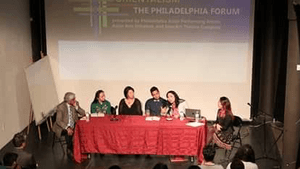Stay in the Loop
BSR publishes on a weekly schedule, with an email newsletter every Wednesday and Thursday morning. There’s no paywall, and subscribing is always free.
Beyond the talk
Asian Arts Initiative, PAPA and InterAct's Beyond Orientalism forum (third essay)

On September 26, Philadelphia Asian Performing Artists (PAPA), hosted a wonderful event at Asian Arts Initiative called Beyond Orientalism: The Philadelphia Forum. This event was part of a national series of conversations kicked off in New York in May by Theatre Communications Group (TCG), Asian American Arts Alliance (A4), Asian American Performers Action Coalition (AAPAC), Alliance for Inclusion in the Arts, and the Smithsonian Asian Pacific American Center.
For all, by us
The Philadelphia forum began with a short documentary of candid interviews with local Asian performing artists discussing yellowface (the practice of using white people to portray Asians onstage), the challenges of being Asian in the performing arts, and the hope that the landscape will change. This video was followed by an eloquent speech and a call to action from Emilya Cachapero, director of Artistic and International Programs at TCG. Next, there was a panel discussion with a roster of Asian arts professionals: actor Justin Jain, Pamela Yau from the City of Philadelphia's Office of Arts, Culture, and Creative Economy, dramaturg Gina Pisasale, behavioral psychologist Dr. Salman Akhtar, and choreographer Maggie Zhao. A discussion followed with audience members asking questions that revealed the complexity of race and racism. There were many deeply insightful comments from members of our community, old and young.
We were proud to present a panel composed entirely of Asians and featuring a video with perspectives from even more local Asian arts professionals. It was an engaging and productive evening. The panel discussed topics such as the importance of casting Asians and other minorities to normalize diversity. We talked about creating access to large cultural institutions and the need for more Asians to work behind the scenes in decision-making roles such as director, producer, designer, and writer. We discussed the necessity of having an Asian consultant in the room when producing a work with an Asian narrative, and more.
I’ve attended a number of diversity forums and town hall meetings. Many ideas and feelings are expressed, and there is rarely a follow up to the conversation. At this forum, we urged everyone in the room to not only engage in difficult topics, but to find ways to shift organizational behavior by defining clear action steps.
Making it happen
The next day, my inbox was flooded with emails containing action proposals from theater artists and leaders. Allies called to discuss best organizational practices. The next day, our forum galvanized seven theater leaders and theater makers to commit to taking clear action. These actions include a promise to attend PAPA events to seek out talent for casting shows, creating cultural advisory committees to select plays for a season, the offer to mentor our younger members at host theaters, proposals to help us find artist grants, and so much more.
To me, this is a sign that we are doing good work, messy and imperfect work, and unfortunately, work that is still unfinished.
Creating change takes time, patience, and many different people representing different perspectives working together. Everyone who attended the event was there because they had good intentions. I believe most people working in the arts are open-minded, progressive, and empathetic. That's why we choose to make art, and that's why we all chose to be in a room to talk about hard issues concerning Asians in theater.
There has been great progress in Philadelphia since we called our first PAPA meeting two years ago. This season, there are 18 Asians working onstage, backstage, or as administrators in the theater community. That is twice as many as were working in Philly theaters in 2013. This season, PAPA has an ambitious program consisting of four staged readings and four performance showcases sponsored by InterAct Theatre and Asian Arts Initiative.
Who's your PAPA?
Individual artists can only accomplish so much. PAPA formed a group based on the shared need to create a community that didn't previously exist. Each member of PAPA identifies as Asian, but we each come from different levels of experience, education, core heritages, and we are vastly different in artistic and political temperament. But we came together because we are stronger together than apart. We can alter the systems in place by creating solidarity.
Judging by the rise in Asian employment in Philly theaters to the immediate positive responses from theater makers who attended the forum, we are continuing the necessary work.
We can't effect change without being heavily supported by our Asian, white, black, and Latino allies. Local theater leaders have generously given us mentorship, free rehearsal and performance spaces, and audition opportunities. It is my hope that we continue these deeper conversations and continue to create organizational action steps in order to reflect and normalize onstage what we see in our daily lives: the rich racial and cultural landscape that truly exists in our city. I am proud of all the Asian Americans who made their voices heard at our forum, and thankful to them and the allies in the room for being part of the change we want to see in our community.
To read Cara Blouin's take on the Beyond Orientalism forum, click here.
To read Lucas Nguyen's take on the Beyond Orientalism forum, click here.
What, When, Where
Beyond Orientalism: The Philadelphia Forum. Sept. 26, 2016 at the Asian Arts Initiative, 1219 Vine St., Philadelphia. (215) 557-0455 or asianartsinitiative.org.
Sign up for our newsletter
All of the week's new articles, all in one place. Sign up for the free weekly BSR newsletters, and don't miss a conversation.

 Bi Jean Ngo
Bi Jean Ngo